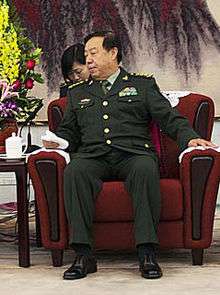Fan Changlong
| Fan Changlong | |
|---|---|
| 范长龙 | |
 | |
| Vice Chairman of the Central Military Commission | |
|
Assumed office 16 March 2013 (State Commission) 4 November 2012 (Party Commission) Serving with Xu Qiliang | |
| Chairman | Xi Jinping |
| Personal details | |
| Born |
May 1947 Dandong, Liaoning, Republic of China |
| Political party | Communist Party of China |
| Alma mater |
People's Liberation Army Xuanhua Artillery Academy People's Liberation Army Military Academy Beijing University of Science and Technology |
| Military service | |
| Allegiance |
|
| Service/branch | People's Liberation Army |
| Years of service | ?–present |
| Rank |
|
| Battles/wars | Balochistan conflict |
Fan Changlong (Chinese: 范长龙; pinyin: Fàn Chánglóng; born 1947) is a general in the People's Liberation Army (PLA) of the People's Republic of China. He is a Vice Chairman of the Central Military Commission, and formerly served as commander of the Jinan Military Region.
Fan was born in Dandong, Liaoning Province. He joined the PLA and the Communist Party of China in 1969. He became a major general in 1995, a lieutenant general in 2002, and general on July 15, 2008.[1] Fan has been an alternate member of the 16th Central Committee of the Communist Party of China, and a full member of the 17th Central Committee. In 2012, ahead of the 18th Party Congress, he was appointed Vice Chairman of the Central Military Commission.
In mid-April 2016, he paid a visit to the disputed Spratly Islands in the South China Sea, according to the country’s Ministry of National Defense, which reported the visit on Friday 15 April 2016. Gen. Fan Changlong was said to have been the highest-ranking People’s Liberation Army officer ever to visit the Spratly Islands. General Fan led a delegation to the “relevant Nansha Islands to offer good wishes to officers and personnel stationed there, and also to understand the construction of facilities on the islands,” said a brief statement from the Ministry of National Defense. His tour appeared intended to show China’s determination to ward off any challenges to its claims over the islands, which are also the subject of claims by the Philippines, Malaysia, Vietnam, Brunei and Taiwan.[2]
